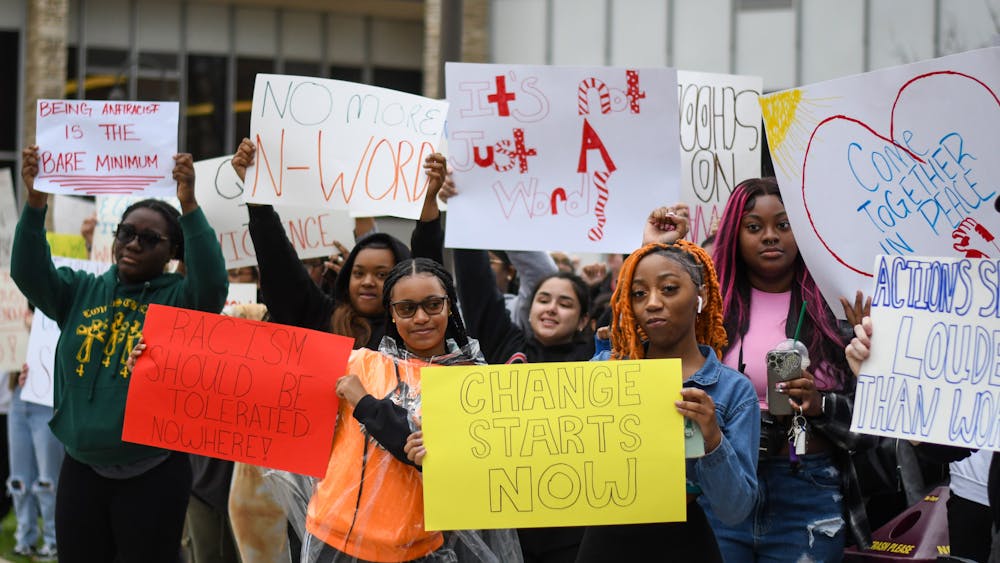Sharing stories to help others heal
Students shared their experiences of dealing with mental health disorders while being a CMU student.
A shift in lighting. The sound of a man’s voice.
It’s often small changes in sensory detail that trigger Jennifer Eskridge’s post-traumatic stress disorder. It’s those sensory cues that transport her back to her 2014 kidnapping and sexual assault in Saginaw during a night out with friends.Now a senior, Eskridge shares her story with “anyone who will care to listen.” The Lapeer senior feels lucky to have found a support group that she says made it possible for her to graduate in May 2017.
Without finding support in her friends, family, and Central Michigan University’s Counseling Center, she isn’t sure she would ever have been able to continue her classes. The man who assaulted her was quickly arrested and charged by police, but her recovery was a more complicated process than she imagined. She attempted to keep attending her classes that semester, but found it was impossible because of how she was triggered by anything similar to the scene of her kidnapping and sexual assault.
“Instead of having control over what I think and feel, I would smell something and it would instantly bring me back,” Eskridge said. “I couldn’t tell you what the smell was and couldn’t tell you why, but for the first couple months it was hard because I didn’t remember everything. I would have a trigger and I would remember something new.
According to the Mayo Foundation for Education and Research, PTSD is a mental health condition triggered by experiencing or witnessing a terrifying event. Symptoms could include flashbacks, nightmares and severe anxiety, as well as uncontrollable thoughts about the event.
When Eskridge re-enrolled at CMU, she introduced herself to all of her professors by confiding in them about her situation and how certain topics might trigger her if brought up in class. Eskridge also made an appointment at the Counseling Center about a month after her assault in October. She’s had the same counselor for the last two years.
“I honestly don’t think I would have come back to school without those people,” she said. “CMU has always been 100 percent understanding that life happens but college needs to be finished. They gave me every tool to finish.”
Use of Central Michigan University’s on-campus Counseling Center increased slightly from last year even though enrollment declined. That’s not unique to CMU, however. A 2014-2015 survey by the Association for University and College Counseling Center Directors found that 73.1 percent of counseling center directors reported an increase in the severity of student mental health concerns and related behavior on their campuses.
“Even when enrollment goes down a bit, our numbers are holding steady or increase a little bit,” said Ross Rapaport, Counseling Center director.
On Oct. 19, there were 36 students on the Counseling Center waitlist. This number is much lower than data collected from the same week last semester of 77 students on the waitlist, even though usage is comparable to last year.
“Students are entering college with increasingly more mental health concerns,” said Tony Voisin, associate vice president of student affairs.
Rapaport said the main thing the Counseling Center provides is a warm and welcoming environment for struggling students. The record for the most attended appointments in a week was set during the week of Oct. 3 with 187 attended appointments.
“By an appointment or two, that’s the busiest we’ve ever been,” Rapaport said. “It’s not a huge (increase), but it just shows that things are continuing even though enrollment is down a little bit.”
There are about 10 counselors on staff that work with students. He is requesting funding to hire another counselor and an additional office professional. Rapaport acknowledges there are many other competing demands seeking those university dollars.
“I do have requests for additional staff, but we’re always competing with other offices and it’s a tight budget,” Rapaport said.
No longer struggling in silence
Soft-spoken and friendly, you wouldn’t know that Christopher Overby has any additional concerns than his classmates. Unlike the students who sit next to him in class or chat with him in the hallway of Moore Hall, Overby must rely on being able to work closely with professors because his schizophrenia symptoms can affect his academic performance.“I explain my situation because in most cases professors haven’t dealt with (a student with schizophrenia) before,” said the junior from Roseville. “So it will be a learning experience for both of us to try to figure out how we can work together to make sure I get the best grades possible without having to drop the class or anything.”
Schizophrenia is a severe mental disorder where people interpret reality abnormally, according to the Mayo Foundation for Education and Research. Symptoms could include hallucinations, delusions and extremely disordered thinking and behavior that impairs daily functioning, which can be disabling.
People with Schizophrenia usually don’t know they have it and perceive hallucinations as reality, but Overby said he is able to differentiate the two. Last year, Overby had to get an extension on a paper when his professor told him the assignment he submitted was “complete gibberish.”
Some days Overby experiences about two to three visual or audible hallucinations a day. Other days it could be more constant throughout the day, but it increases when his workload in school and overall stress level is high.
“I understand every college student has a hard time trying to find motivation to do homework, but on a daily basis I find it extremely hard to find motivation for certain things,” Overby said.
Overby’s hallucinations are audible and visual and usually involve him seeing family members or loved ones. A broadcast major, he had to drop an audio tech class because his audible hallucinations made it too hard for him to do the assignments.
“I’ve had it before where I hear a professor’s voice and I look up and the professor was saying something different or just not talking at all,” Overby said.
In their experience of being transparent about their mental illness with professors, Overby and Eskridge have both had mostly positive experiences of support from professors, faculty and staff at CMU.
But some parts of Overby’s psychosis hinder him no matter how understanding people in his life are.
“Telling people could have certain side effects on me, so it’s really hard when I have to tell four to five professors in one week,” Overby said. “I just kind of hope for the best situation.”
Even when the Counseling Center has a waiting list, students can still get receive same day counseling services in emergency situations. Students with mental health issues need to know they’re not alone, Rapaport said.
“Seeking help is not a sign of weakness, it’s a sign of strength,” he said.
When on the waiting list, students are directed to self-care techniques, different resources and emergency hotlines that can be found on the center’s new streamlined website.
“I think there’s more support for people to get help and assistance for themselves if they have mental health concerns, but there is still a stigma,” Rapaport said. “We have a way to go.”
Beyond the Counseling Center
Other on-campus resources for mental health include the Psychology Training and Consultation Center located in Health Professions Building, the Center for Community Counseling and Development in the Education and Human Services Building and the CARE Team.
The Center for Community Counseling and Development provides counseling experience to students in the Master’s Program in Counseling Education while the Psychology Training and Consultation Center provides training for clinical psychology students who treat patients for their practicum placement. Both centers see far less patients than the Counseling Center and also serve the community residents.
Anyone is able to submit a CARE report on the university website if they have a concern for a CMU student’s mental health. A small group of CMU staff and faculty from offices across campus review the reports from 8 to 4:30 p.m. Monday through Friday.
The team decides the best person from the team to reach out to the student and asks them if they need support or connection to services. If the students say yes, a CARE team member will sit down with them and connect them to resources. If a student says no, the team will back off unless there is suggestion of an imminent threat to their safety.
The amount of reports has increased, said Deanna Johnson, coordinator of the CARE Team.
“We’re making efforts like the CARE Team recognizing there’s a need, but we have to get better at recognizing the array of resources that are already available,” Johnson said.
Students interested in scheduling an appointment at the Counseling Center can make a free appointment by calling 989-774-3381.





